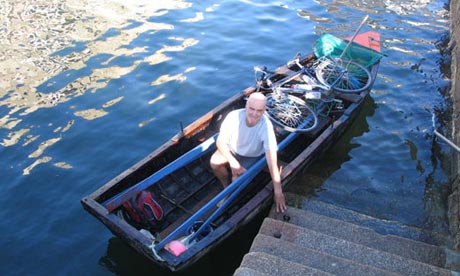
I've not had many punctures on this trip. Just four, to be precise. The third was supposed to be the last, because after it I'd bought a new inner tube, whose USP was its self-healing properties, facilitated by the automatic release of a green goo that would plug any hole. No more punctures. It sounded too good to be true. It was.
I was pootling along the stunning coast road north of Land's End, marvelling at the wide skyline punctuated by the chimneys of long-abandoned tin mines, when there came the sound of hissing from my front tyre. Excited, I leant over the handlebars to watch the green goo work its magic.
Luminous gunk spat out of the hole, like in a scene from The Exorcist, ricocheting off panniers and mudguards, ultimately splattering my face in slime. Then the tyre went flat. I stopped to change the tube. There was a convex mirror nearby adorning the top of a farm track with an awkward exit. I peered at myself, all stretched and green. I looked like Shrek.
After Pendeen, the GPS display changed from south-west to due south. I'd run out of Britain. I passed the Last Inn In England, rolled into Land's End, crossed the start/finish line painted on the road, and pedalled past attractions designed to capture the essence of such a raw and elemental spot – Doctor Who Up Close, The West Country Shopping Village, The Last Labyrinth – beyond which was the dull business of mighty waves crashing against cliffs and the maelstrom of colliding seas.
At the famous signpost, a queue of people waited to have their pictures taken by the official photographer. For a party from Brisbane an extension was fitted to the direction arrow, pointing down. A man from Horncastle posed proudly with his mark one Ford Fiesta.
Colin and Elaine from Wolverhampton were celebrating their third wedding anniversary. "We came here on our honeymoon," Elaine said. "Since then Colin's lost 10 stone." She put her arms around her husband's waist for the photo, a little more comfortably, I'd imagine, than last time they were there.
I pointed the Ridgeback east, crossed the start/finish line again, and felt I was truly heading home. I pedalled up and down steep lanes past St Michael's Mount and on to the Lizard, where the sparse vegetation and occasional wind-bent gorse bush put me in mind of the African savannah, until a sea fog made the world disappear and I was alone with my breathing and the sound of my tyres. By the time the wind had blown away the mist, the savannah had sprouted the vast satellite dishes of Goonhilly.
At a slipway in Falmouth I watched a man row ashore in a boat that looked as if it was made of old fabric and twigs. "It's a replica of a currach, the type of boat that carried the early Irish diaspora," the man, whose name was Rory, said. "St Piran, the patron saint of Cornwall, rowed here from Ireland in the sixth century in one just like it."
Rory, a lecturer in marine environmental management, told me how, back in the 1980s, he'd read a book about the boats of the Polynesians and Inuits and Celts, and thought: "That's what I want to do with my life. Build boats using ancient, intuitive design and try and figure out what voyages would have been possible using them."
He explained that he goes up local creeks for four or five days at a time, bivvying at night, making stews from the prawns and velvet crabs he catches, and the marsh samphire he finds. "For me, it's all about reconnecting nature, history and self-reliance," he said.
After he heard what I was doing on my bike, Rory offered to row me the two miles across the Carrick Roads to St Mawes. We unloaded the bike and placed the panniers in the currach, then balanced the bike precariously on top. We set off, me sitting on the stern transom like a Lycra-clad pharaoh, the gunwales inches above the water, as he pulled on the rough-hewn, plank-like oars. He'd built the currach using bent hazel rods and laths of larch.
"And the skin?" I asked, glancing nervously at the fragile-looking fabric.
"Artist's canvas, from Trago Mills in the high street," he replied.
"I bought a new tarp from there," I said. "It cost 59p."
"This fabric only cost 40p," said Rory.
"And how deep is this harbour?" I asked.
"Oh, pretty deep," said Rory, laughing, as he pulled towards St Mawes, ducking between the large dredgers and ferries ploughing up the Roads.
• MILES THIS WEEK 275. Total miles 4,035
• CONTACT currach.blogspot.com

